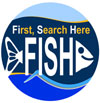
The term "periodical" refers to anything that is published at regular intervals throughout the year such as a newspaper, magazine, or journal:
A database is a collection of sources including books, ebooks, magazines, journals, and newspapers.
Use the library's Research Guides for your course of study or ask a librarian to identify the best database for your information need.
You can also find resources for your research by selecting from the full list of databases the library subscribes to. For descriptions of database coverage and a list of the library's most popular databases, click View More Results.
The short video below describes how to run a search in FiSH. FiSH (First, Search Here) searches most of the library resources using one simple search box. To search FiSH, use the box below or visit the Library Home Page.

What is a scholarly source?
A scholarly source is material written by an expert or experts (scholarly articles will often have multiple authors) for other experts. If a journal is peer reviewed, that means scholars in the field looked at the material and made comments or recommendations before it could be published, this process ensures that the information is more credible than, say, a website like Yahoo Answers or Reddit. Often these scholarly, peer reviewed articles describe a study that was done, including the objectives and outcomes.
How do I know that a source is scholarly?
Often, your professors will require you to use scholarly sources, so how can you tell that this requirement is being met? The New York Times seems like a credible source, but is it scholarly?
Here are some criteria that can help you determine if a source is scholarly (or not):
Periodical Comparison Chart |
||||
| Newspapers | Magazines | Journal (Opinion) | Journal (Scholarly) | Journal (Trade) |
| Plain Dealer, Wall Street Journal | Newsweek, Psychology Today, Billboard | The New Republic, The Animal's Agenda | Crystal Engineering, New England Journal of Medicine | Journal of the American Library Association, Publisher's Weekly |
| General readership - news, opinions, text of speeches, local interest | Overviews, non-technical language, advertisements | Journal has specific agenda written to appeal to like-minded readers | Professional readership - research, analysis, technical vocabulary | Journal of association or trade organization meant for people in that field |
| By-line for important staff writers, often no author named, no credentials given | By-line for important staff writers, often no author named, no credentials given | Featured writers have by-line, staff writers often not named, no credentials given | All contributing authors named with their degrees and sponsoring institution | Varies - some name authors and their credentials, others not |
| Articles often do not refer to sources | No bibliography, articles may refer to other sources | No bibliography, articles may refer to other sources | Extensive bibliography, footnotes in text, article often begins with literature review | Varies from journal to journal |
| Standards set by newspaper editors and owners | Staff editors, no peer or expert review | Staff editors, no peer or expert review | Articles "peer reviewed" for accuracy by other experts | Staff editors, no peer or expert review |
| Brief overview articles or follow-up columns | Short overview articles meant as starting point for readers | Short articles supporting journal's agenda | Comprehensive papers outlining original research or new synthesis of previous research | Shorter overview articles applying to specific topics in trade |
| Photographs, some charts, maps etc. | Advertisements, photographs, illustrations, maps etc. | Advertisements, photographs, illustrations, maps etc. | Tables, graphs, charts, maps, illustrations to support text | Advertisements, photographs, illustrations |
| No consistent format for articles | No specific structure unless written by featured writer | No specific structure unless written by featured writer | Structured, beginning with abstract, literature review, methodology, results, conclusion, bibliography | No specific structure unless written by featured writer |
 |
Lakeland Community College Library 7700 Clocktower Drive | Kirtland, Ohio 44094-5198 | 440.525.7425 lakelandcc.edu | my.lakelandcc.edu |